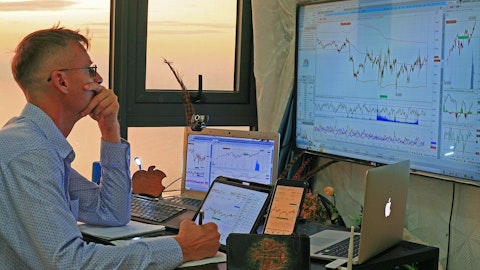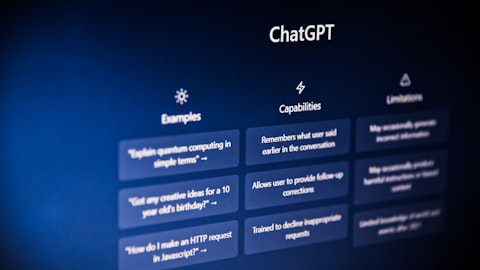In this article, we are going to discuss the 20 Countries With The Toughest Education In The World with insights into PISA Scores. You can skip our detailed analysis and go directly to 5 Countries With The Toughest Education In The World.
Generative AI dominated the educational market in 2023, with careful exploration in the post-secondary sector hinting at a future ripe for disruption. While the full impact remains a question mark, this wave of innovation is expected to usher in a surge of new products and players, potentially re-drawing the competitive map, even in sectors as established and traditionally inflexible as the hardest education systems. Additionally, international education is experiencing a resurgence, fueled by renewed interest and the potential for AI-powered solutions to bridge geographical divides. This convergence of trends sets the stage for an exciting, dynamic, and potentially transformative year ahead in the world of education.
Despite significant fluctuations in recent years, the education sector remains a substantial force in the financial landscape, with nearly 300 listed companies collectively boasting a market cap of roughly $200 billion. 2023 saw modest activity, with approximately 20 small and medium-sized IPOs but no major deals. Conversely, private equity found fertile ground through four notable take-private transactions, seizing opportunities to restructure, reinvigorate, or fast-track growth for acquired brands outside the public eye. The overall picture hints at a mature industry seeking stability and strategic shifts rather than explosive growth, with private equity playing a pivotal role in reshaping the landscape for future expansion.
Education is poised for a phenomenal surge, reaching a projected $10 trillion market size by 2030. This impressive 4.5% compound annual growth rate (CAGR) will see education climb to over 6% of the global Gross World Product (GDP), solidifying its role as a major driver of the global economy.
A Look Into the Education Market
In today’s dynamic business world, upskilling and reskilling are no longer luxuries but necessities. That’s where Udemy Inc (NASDAQ:UDMY) is the go-to platform for individuals and organizations seeking high-quality, accessible online education. Boasting a market cap of $2.29 billion, Udemy Inc (NASDAQ:UDMY) empowers companies with a comprehensive learning library of over 200,000 courses from industry experts, covering everything from cutting-edge tech skills to in-demand business fundamentals, including some of the toughest courses in the world.
More than 15,000 global customers, from Fortune 500 giants to nimble startups, trust Udemy Inc (NASDAQ:UDMY) Business to equip their workforce with the knowledge and skills to thrive in constant change. Their subscription model gives employees on-demand access to a vast learning library, allowing them to personalize their professional development journeys. In a strategic move to combat the widening skills gap among developers, Udemy Inc (NASDAQ:UDMY) and Docker have joined forces. This new partnership empowers Docker’s 20 million active users with unrivaled access to upskilling and reskilling opportunities. The collaboration unlocks a treasure trove of curated learning paths and over 350 real-time training modules tailored explicitly for Docker technologies.
Google AI, a product of Alphabet Inc Class C (NASDAQ:GOOG), is actively shaping the future of learning, offering powerful tools that make complex concepts easier to grasp and unlock new levels of efficiency. In 2023, Alphabet Inc Class C’s (NASDAQ:GOOG) Google AI took significant educational strides, setting new benchmarks for intelligent learning tools. Building on the success of AlphaCode, the AI coding whiz that rivals top programmers, we launched AlphaCode 2. This upgraded version, powered by cutting-edge technology, solved 70% more problems and outperformed 85% of competitors on the same platform. That’s a game-changer in the world of programming education!
But Alphabet Inc Class C (NASDAQ:GOOG) didn’t stop there. AlphaDev, another AI innovation, used reinforcement learning to discover a significantly faster sorting algorithm. This breakthrough improved the widely used LLVM library, making data processing speedier and more efficient. It’s like training your computer to be a master organizer, saving you valuable time and resources.
Methodology
To curate our list of 20 Countries With The Toughest Education In The World requires a nuanced approach, acknowledging the inherent subjectivity of such a ranking. Factors like societal pressure on students, rigorous curriculum, extended study hours, and high-stakes exams all contribute to the perceived “toughness” of a system. We delved into diverse online communities like Reddit and Quora to gather insights while considering standardized assessments like PISA scores. Countries consistently ranking high in PISA often boast demanding curricula and are often perceived as having some of the most challenging education systems. Below is our list of 20 Countries With The Toughest Education In The World in descending order of PISA score.
By the way, Insider Monkey is an investing website that tracks the movements of corporate insiders and hedge funds. Using a similar consensus approach, we identify the best stock picks of over 900 hedge funds investing in US stocks. The top 10 consensus stock picks of hedge funds outperformed the S&P 500 Index by more than 140 percentage points over the last 10 years (see the details here). Whether you are a beginner investor or a professional looking for the best stocks to buy, you can benefit from the wisdom of hedge funds and corporate insiders.

Pressmaster/Shutterstock.com
20 Countries With The Toughest Education In The World
20. Belgium
PISA Score: 486
Belgium’s education system might not be for the faint of heart. Known for its rigorous academics and focus on critical thinking, it’ll challenge even the most dedicated students. But what it may lack in ease certainly makes up for affordability. Public universities in Belgium are notoriously cheap, with EU students paying a mere €1,000 a year, a steal compared to international tuition elsewhere. Even non-EU students can snag a quality education for a fraction of the cost, with fees between €2,500 and €7,500
19. Sweden
PISA Score: 488
Sweden’s education system isn’t for the academically timid. Buckle up for a high-pressure ride known for its demanding coursework and emphasis on independent thinking. It’s not just a marathon; it’s a sprint – compulsory education starts at age six and wraps up by 15. But the pace doesn’t slacken even then. An academic year is structured around 60 credits, each demanding roughly 1,500-1,800 hours of dedication, and to pass, 60% is needed.
18. United States
PISA Score: 489
Renowned for its diverse, highly competitive landscape, studying in the States offers access to some of the planet’s top universities and colleges. However, that prestige comes at a cost. U.S. education fees are notorious for being sky-high, with annual tuition at prestigious institutions surpassing $50,000. This hefty price tag isn’t just for bragging rights; expect rigorous coursework, demanding workloads, and a constant push to excel.
17. Czech Republic
PISA Score: 491
The Czech Republic boasts a robust and diverse higher education landscape, encompassing 60 institutions. 26 public and two state universities offer a broad spectrum of academic disciplines. Additionally, 32 private higher education institutions cater to specialized fields and niche interests. Notably, 18 foreign higher education institutions and their branches operate within the country, further enriching the educational tapestry. However, the Czech system is renowned for demanding academic rigor, emphasizing critical thinking and independent study.
16. Denmark
PISA Score: 491
Denmark’s education system prioritizes high-quality schooling with a focus on fostering independent learners and critical thinkers. Education is compulsory for ten years, encompassing one pre-school year and nine school years. Throughout this period, students encounter a diverse curriculum emphasizing core subjects like mathematics, science, and language alongside cultural awareness and practical skills. Notably, Denmark boasts a unique model of upper secondary education, offering students a choice between general, vocational, and academic programs tailored to their strengths and future aspirations.
15. Poland
PISA Score: 492
Poland’s education system cultivates academic solid foundations and is known for its emphasis on rigorous curricula. Students embark on a demanding journey with eight years of compulsory primary education, followed by four or five years of secondary education focused on either general academic or vocational tracks. This commitment to thorough instruction is reflected in Poland’s impressive performance on international assessments, such as the Programme for International Student Assessment (PISA), where they consistently rank among the top-performing nations in mathematics and science.
14. United Kingdom
PISA Score: 494
The United Kingdom’s education system prioritizes a challenging academic curriculum and holistic development. Students embark on a structured journey with four key stages focused on foundational skills like English, mathematics, sciences, humanities, and a modern language. Beyond these mandatory subjects, individual schools offer varied options to cater to diverse interests and aptitudes. A pivotal year occurs at Year 9, where students enter secondary education, encountering more demanding coursework and specialized subject choices. This transition year underscores the system’s commitment to nurturing independent learning and preparing students for rigorous academic pursuits.
13. New Zealand
PISA Score: 495
The New Zealand education system presents a compelling mix of intellectual intensity and accessibility. From the early childhood education (ECE) level, where the government subsidizes up to 6 hours of daily attendance, children are immersed in a stimulating environment built on exploration and discovery. As they progress through primary and secondary school, the focus shifts to a robust academic curriculum emphasizing core subjects like English, mathematics, and science alongside critical thinking and independent learning. New Zealand universities are renowned for their demanding coursework and high academic standards, requiring students to devote significant effort to succeed.
12. Finland
PISA Score: 495
Finnish schools are challenging, but they can set you up for success! Early years are fun and relaxed, but later on, things get complicated. School starts at age 7 with minimal pressure and standardized testing, fostering a love for learning through play and exploration. However, once formal studies begin, students encounter a rigorous curriculum prioritizing application over rote memorization. Expect in-depth discussions, open-ended assignments, and tests requiring well-crafted explanations, not just single-word answers. Extracurricular activities, while encouraged, hold no sway in college admissions – the focus is solely on mastering academic content.
11. Australia
PISA Score: 497
Australia’s education system offers a challenging intellectual journey and is renowned for its strong academic standards and emphasis on critical thinking. Both state-owned and private high schools, encompassing 70% and 30% of students, respectively, adhere to strict regulations and employ highly qualified teachers. The curriculum prioritizes a comprehensive set of core subjects, demanding active participation and independent learning. Australia’s system requires dedication and intellectual curiosity, ultimately equipping students with the knowledge and skills to thrive in a competitive academic world.
10. Switzerland
PISA Score: 498
Switzerland’s education system offers a challenging academic climb and is known for its demanding standards and focus on essential skills. Students tackle 11 years of compulsory education, mastering core subjects and multiple languages. After this solid foundation, they face a crucial decision: dive into rigorous coursework and critical thinking on the academic track or hone practical skills and professional expertise on the vocational path. Both options require dedication, with the academic route emphasizing depth and independent study, while the vocational course focuses on hands-on training.
9. Ireland
PISA Score: 504
Ireland’s education system offers a demanding intellectual journey, fostering independent learners within a supportive environment. Students encounter a rigorous curriculum throughout secondary school, culminating in the challenging Leaving Certificate exams, a key gateway to higher education. Additionally, Ireland welcomes international students, offering quality education for around €10,000 to €20,000 per year, making it a compelling choice for those seeking a rewarding academic experience with supportive surroundings.
8. Canada
PISA Score: 506
Canada’s education system, while often praised for its accessibility and progressiveness, faces concerns regarding its consistency and effectiveness across all levels. While boasting strong, high-performing institutions, critiques point to weaknesses in foundational skills like math and science in primary and secondary education. Concerns arise from factors like functional illiteracy among graduates, high dropout rates, and perceived inadequacies in STEM teaching. This disparity presents a complex challenge for Canada, highlighting the need for focused efforts to ensure all students receive a quality education that equips them for success in a competitive world.
7. Estonia
PISA Score: 516
Estonia’s education system has a long history of top-notch teaching dating back to medieval times, and they’ve used modern tech to keep that edge. This means Estonian schools are no walk in the park. Bachelor’s and Master’s degrees take at least five years to earn, and the workload is hefty, clocking in at 300 credits. Estonia takes education seriously, and its rigorous system is churning out some of the world’s best-educated minds.
6. Hong Kong
PISA Score: 520
The education system of Hong Kong is built around intense testing and high expectations. This means Hong Kong students consistently snag top spots in global math, science, and reading rankings, except those solely based on test scores. Students face a hefty workload on top of the expectations piled on by parents, teachers, and society. It’s a grind, but the results speak for themselves. While seemingly objective, the education system’s focus on achieving high marks on standardized tests at each level may inadvertently limit learning to the mere reproduction of factual information.
Click to continue reading and see the 5 Countries With The Toughest Education In The World.
Suggested Articles:
- 12 Asian Countries With The Best Education System
- 17 Countries With The Best Education In Europe
- 20 Most Advanced Countries in Education
Disclosure: None. 20 Countries With The Toughest Education In The World is originally published on Insider Monkey.





